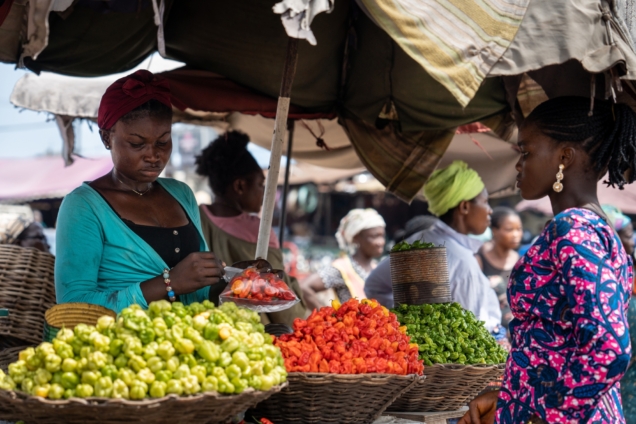Ghana continues to grapple with price hikes as the year-on-year inflation rate for January 2024 sees a marginal rise.
It hits 23.5%, making it one of the Sub-Saharan African countries experiencing the highest inflation with its current rate being almost 3 times the combined rates of neighbouring Ivory Coast, Burkina and Togo.
Within the ECOWAS bloc, both Ghana and its economic counterpart, Nigeria, share inflation rates above 20%, with Nigeria’s nearing 30%.
In contrast, neighbouring countries like Ivory Coast, Togo and Burkina Faso boast of single-digit inflation rates. In fact, Burkina Faso which is currently under military leadership has its current inflation rate pegged at 4.3% with Togo recording as low as 2%. The 2023 AFCON winners, Ivory Coast also boast of a single-digit inflation with its most recent rate positioned at 3.1%.
It is noteworthy that Ghana’s inflation has not touched single digits for almost four years, with the last instance occurring in March during a lockdown. Despite receiving close to $2 billion from the IMF, World Bank and the African Development Bank within the past year and a half under the Extended Credit Facility Programme, Ghana is struggling to maintain healthy international reserves.
The country’s Gross International Reserves have plummeted from a historical peak of $11 billion, providing almost six months of import cover, to $5.9 billion as of January 2024, affording less than three months of import cover. This decline has intensified pressure on the local currency, the cedi, leading to its depreciation against major trading currencies such as the US dollar.
The exchange rate fluctuations impact import duties and other costs, contributing to the rising domestic prices of imported goods. Food inflation stands at 27.1%, persistently rising for four consecutive months and surpassing the overall inflation rate of 23.5%. Ongoing border restrictions in Niger, Mali, and Burkina Faso continue to impact the prices of essential farm produce like onions and tomatoes imported into Ghana.
Notably, key ingredients for common household meals, including jollof, banku and fufu, have recorded inflation rates above 40% in January. With a substantial weight of 1.2 in determining national inflation, fresh tomatoes have surged by 52.3%. Other crucial ingredients like cassava, fish, carrots, and garden eggs have inflation rates twice the national average.
With the December 2024 general election approaching, Ghanaian voters prioritise key issues such as price stability, a resilient currency, and tackling unemployment. Addressing these concerns as the country faces economic headwinds has become paramount for the electorate.
About the writer:
Isaac Kofi Agyei is a Data & Research Analyst/Journalist at JoyNews based in Accra, where he covers mostly finance, economics, banking, and politics across Ghana and West Africa, from detailed analytical reports on all key issues to debt crises to IMF programmes. He also serves as the data and research correspondent for SBM Intelligence, an Africa-focused market/security leader in strategic research, providing actionable analyses of West Africa’s socio-political and economic landscape. With his solid academic background in economics and statistics and additional training from credible institutions such as the UNDP, Afrobarometr, Ghana Statistical Service, and a host of others, Isaac has honed his skills in effective data storytelling, reporting, and analysis.

Isaac Kofi Agyei
Latest Stories
-
Paris 2024: Opening ceremony showcases grandiose celebration of French culture and diversity
3 hours -
How decline of Indian vultures led to 500,000 human deaths
4 hours -
Paris 2024: Ghana rocks ‘fabulous fugu’ at olympics opening ceremony
4 hours -
Trust Hospital faces financial strain with rising debt levels – Auditor-General’s report
4 hours -
Electrochem lease: Allocate portions of land to Songor people – Resident demand
5 hours -
82 widows receive financial aid from Chayil Foundation
5 hours -
The silent struggles: Female journalists grapple with Ghana’s high cost of living
5 hours -
BoG yet to make any payment to Service Ghana Auto Group
5 hours -
‘Crushed Young’: The Multimedia Group, JL Properties surprise accident victim’s family with fully-furnished apartment
5 hours -
Asante Kotoko needs structure that would outlive any administration – Opoku Nti
6 hours -
JoyNews exposé on Customs officials demanding bribes airs on July 29
6 hours -
JoyNews Impact Maker Awardee ships first consignment of honey from Kwahu Afram Plains
7 hours -
Joint committee under fire over report on salt mining lease granted Electrochem
8 hours -
Life Lounge with Edem Knight-Tay: Don’t be beaten the third time
8 hours -
Pro-NPP group launched to help ‘Break the 8’
8 hours

